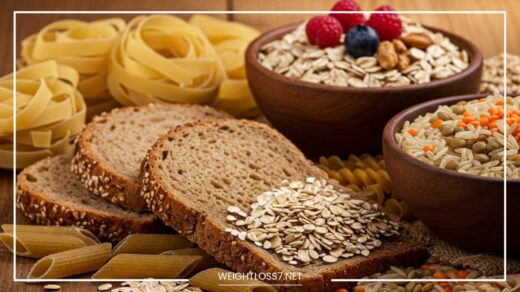How Do I Lose Weight

How Do I Lose Weight
Embracing a Healthier You: A Comprehensive Guide to Sustainable Weight Loss
Embarking on a journey toward a healthier weight is an empowering and transformative decision. This process is not merely about fitting into smaller clothes but about improving your overall well-being, boosting your energy levels, and significantly reducing the risk of chronic diseases such as diabetes, heart disease, and high blood pressure.
Achieving sustainable weight loss involves more than just cutting calories—it’s about adopting a balanced, mindful approach to nutrition and making lifestyle changes that support long-term health and vitality.
This comprehensive guide will walk you through the key elements of achieving sustainable weight loss, with a focus on nourishing your body with wholesome, plant-based foods and incorporating healthy habits that promote lasting success.
Understanding the Fundamentals of Weight Loss
At its core, weight loss revolves around a fundamental principle: creating a calorie deficit. This means burning more calories than you consume.
Your body requires calories for energy, and when it consistently receives fewer calories than it needs, it starts to tap into its stored energy reserves, primarily fat, to fuel its functions, leading to weight loss.
However, it’s important to note that drastic calorie restriction can be counterproductive. Cutting calories too sharply can cause nutrient deficiencies, slow down your metabolism, and ultimately result in unsustainable weight loss.
Instead, a healthier, more effective approach involves focusing on the quality of the food you consume.
Incorporating nutrient-dense, plant-based foods, such as fruits, vegetables, whole grains, and legumes, provides your body with essential vitamins, minerals, and fiber while helping you feel satisfied and energized.
In addition to a balanced diet, regular physical activity plays a crucial role in sustainable weight loss.
Engaging in both aerobic exercises (like walking, running, or swimming) and strength training (like lifting weights or bodyweight exercises) helps to increase muscle mass, which in turn boosts metabolism and enhances fat burning.
Ultimately, achieving lasting weight loss is about making gradual, mindful changes to your lifestyle, focusing on nourishment, movement, and consistency. With patience and persistence, you can achieve a healthier, more balanced version of yourself.
The Power of Plant-Based Nutrition
The food you choose to nourish your body with is one of the most important factors in your weight loss journey.
Adopting a plant-based diet offers an abundance of benefits, particularly when it comes to achieving and maintaining a healthy weight.
Plant-based foods are naturally lower in calories and fat compared to animal products, while being rich in essential nutrients, fiber, and water.
These elements are crucial for optimal health and weight management. Among these, fiber stands out as a key player, helping to regulate digestion, stabilize blood sugar levels, and promote satiety.
This means you’ll feel fuller for longer, reducing the likelihood of overeating and promoting more mindful eating habits.
In addition to fiber, plant-based foods are high in antioxidants and phytonutrients, which support overall health and provide anti-inflammatory benefits.
By focusing on these nutrient-dense foods, you’re not just aiding your weight loss efforts, but you’re also enhancing your energy levels and overall vitality.
Below, we will dive deeper into some of the key plant-based food categories that should be staples in your diet if you’re aiming for sustainable weight loss.
Fueling Your Body with Nature’s Bounty
Incorporating a variety of whole, plant-based foods into your meals not only ensures you receive a wide array of nutrients, but it also adds flavor, texture, and variety to your diet. Let’s explore some essential plant-based food groups that can support your weight loss goals:
- Fruits: Often referred to as nature’s candy, fruits are loaded with vitamins, minerals, fiber, and antioxidants. They are an excellent choice for satisfying your sweet tooth while providing numerous health benefits. Fruits like berries, apples, bananas, oranges, and melons are particularly rich in vitamin C, which supports immunity and skin health. Additionally, their high water content helps with hydration, and the natural sugars found in fruits are absorbed more slowly than processed sugars, making them a healthier alternative for curbing sugar cravings. You can enjoy fruits as snacks, in smoothies, or incorporated into salads and main dishes. Opting for a variety of colorful fruits not only adds visual appeal to your meals but also ensures a wide spectrum of nutrients.
- Vegetables: Vegetables are undoubtedly the cornerstone of any healthy eating plan. They are low in calories yet packed with essential vitamins, minerals, and fiber, making them perfect for weight loss. Vegetables like leafy greens (spinach, kale), cruciferous vegetables (broccoli, cauliflower), root vegetables (carrots, sweet potatoes), and colorful varieties (bell peppers, tomatoes) offer an incredible nutrient profile. Cruciferous vegetables, in particular, are rich in compounds that support detoxification and may even help prevent certain cancers. Experiment with different cooking methods—steaming, roasting, grilling, or stir-frying—to keep your vegetable dishes exciting and flavorful.
- Legumes: Beans, lentils, and peas are true nutritional powerhouses. These plant-based protein sources are rich in fiber, which promotes fullness and aids in digestion. Legumes also help stabilize blood sugar levels, making them a great option for those managing insulin sensitivity. Their versatility makes them easy to include in soups, stews, salads, and as a protein-rich substitute for meat in various dishes. Lentils, chickpeas, black beans, and kidney beans are particularly high in fiber and protein, and they provide essential minerals such as iron and magnesium, which support heart and muscle function.
- Whole Grains: Whole grains are an excellent source of slow-digesting carbohydrates, fiber, and important micronutrients like B vitamins and iron. Unlike refined grains, which are stripped of their bran and germ, whole grains retain all of their natural nutrients, providing sustained energy and supporting digestive health. Include options like quinoa, brown rice, oats, barley, and whole wheat bread in your diet. These complex carbohydrates help regulate blood sugar levels and keep you feeling full longer, reducing the temptation to snack between meals.
- Nuts and Seeds: While nuts and seeds are higher in calories compared to other plant-based foods, they are packed with healthy fats, protein, and fiber, making them a great addition to any weight loss plan when consumed in moderation. Almonds, walnuts, chia seeds, flax seeds, and pumpkin seeds are excellent sources of omega-3 fatty acids, which support heart health and reduce inflammation. Nuts and seeds also provide satiety and can help curb hunger between meals. However, it’s important to watch portion sizes as they are calorie-dense. Choose unsalted varieties to keep your sodium intake in check.
The Benefits of a Balanced, Plant-Based Diet
A plant-based diet offers a wide range of benefits that extend beyond weight loss. By prioritizing whole, nutrient-dense foods, you are setting the foundation for better overall health, including improved heart health, better digestion, and enhanced mood and energy levels.
The abundance of fiber, vitamins, and antioxidants found in plant-based foods supports a strong immune system, reduces inflammation, and helps regulate metabolism.
When combined with regular physical activity and mindful eating habits, a plant-based diet can help you achieve sustainable weight loss and long-term wellness.
By making these simple yet powerful dietary choices, you can fuel your body with the nutrition it needs to thrive and make lasting changes to your health.
Smart Eating Strategies for Weight Loss
Achieving sustainable weight loss isn’t just about choosing the right foods—how you eat can make a significant difference in your success.
Implementing mindful eating habits can help you control portions, stay on track with your goals, and prevent overeating. Below are some smart eating strategies to enhance your weight loss journey:
- Portion Control: Being mindful of portion sizes is crucial in preventing overeating. It’s easy to consume more than you need, especially when eating from large plates or bowls. Try using smaller plates and bowls to naturally reduce your portions. Additionally, paying attention to your body’s hunger and fullness signals can help you avoid eating until you’re overly stuffed. By listening to your body and stopping when you’re satisfied (not full), you can prevent unnecessary calorie intake while still feeling content.
- Mindful Eating: One of the most effective ways to curb overeating and improve your relationship with food is to practice mindful eating. This means eating without distractions such as television, phones, or computers. When you focus on the taste, texture, and aroma of your food, you’re more likely to recognize when you’re full. Eating slowly allows your body time to send signals of fullness to your brain, helping you avoid overconsumption. Take the time to savor every bite and truly enjoy your meals—it can lead to greater satisfaction and fewer cravings later on.
- Meal Timing: While there isn’t a single rule for meal timing that works for everyone, establishing a regular eating schedule can help regulate your hunger and prevent binge eating. Skipping meals often leads to intense hunger later in the day, making it more challenging to make healthy choices. Try to eat balanced meals at consistent times throughout the day to stabilize your appetite and maintain steady energy levels.
- Hydration is Key: Hydration plays a vital role in weight management. Water is necessary for numerous bodily functions, including metabolism and digestion. Sometimes, feelings of hunger are actually a sign of dehydration, so drinking water regularly can help you distinguish between actual hunger and thirst. Aiming for at least 8 glasses of water a day is a good starting point, but if you’re physically active or living in a hot climate, you may need more. Drinking water before meals can also help you feel fuller, reducing the chances of overeating.
Incorporating these smart eating strategies into your daily routine can support your weight loss efforts and help you build a more balanced and sustainable approach to healthy living.
By focusing on portion control, mindful eating, regular meals, and staying hydrated, you’ll be able to cultivate habits that not only help you lose weight but also improve your overall well-being.
The Indispensable Role of Physical Activity
While making dietary changes is a key component of weight loss, incorporating regular physical activity is equally important for achieving long-term success and maintaining overall health.
Exercise not only helps you burn calories but also builds muscle mass, boosts your metabolism, and improves your cardiovascular health.
Moreover, physical activity enhances mood, reduces stress, and contributes to a better quality of life, making it an essential part of any weight loss or wellness plan.
Finding Activities You Enjoy
One of the most important aspects of maintaining an active lifestyle is finding exercises that you genuinely enjoy. When you choose activities that bring you joy, you’re more likely to stick with them over the long term.
There are many forms of exercise to explore, and each offers its own benefits. Here are some key types of physical activity that can support your weight loss goals:
- Cardiovascular Exercise: Also known as aerobic exercise, cardiovascular activities increase your heart rate and help burn calories. These activities include brisk walking, jogging, swimming, cycling, and dancing. The goal is to aim for at least 150 minutes of moderate-intensity aerobic exercise or 75 minutes of vigorous-intensity aerobic activity per week, as recommended by health guidelines. Engaging in cardiovascular exercise not only helps with weight loss but also strengthens the heart, improves lung capacity, and enhances overall endurance.
- Strength Training: Building muscle mass through strength training exercises is crucial for boosting metabolism and burning fat, even when you’re not actively exercising. Muscle tissue burns more calories at rest compared to fat tissue, which means that increasing muscle mass helps to accelerate your metabolism. Aim to incorporate strength training exercises at least two days per week, targeting all major muscle groups. You can use free weights, resistance bands, or perform bodyweight exercises like squats, lunges, push-ups, and planks to build strength and tone muscles.
- Flexibility and Balance Exercises: Activities like yoga, Pilates, and tai chi not only enhance flexibility and balance but also improve overall mobility. These exercises are beneficial for reducing the risk of injuries, improving posture, and promoting mental relaxation. Flexibility and balance exercises can complement your cardiovascular and strength training routines, helping to create a well-rounded fitness plan.
The Importance of Consistency
To experience the full benefits of physical activity, consistency is key. It’s not about doing intense workouts every day; rather, it’s about making movement a regular part of your lifestyle.
Start with activities you enjoy, gradually increasing the intensity and duration as your fitness improves.
The more you make exercise a habit, the easier it becomes to maintain an active lifestyle that supports both your weight loss goals and overall health.
By finding a balance between cardiovascular exercise, strength training, and flexibility exercises, you can create a comprehensive fitness routine that not only helps you lose weight but also improves your mental and physical well-being.
Beyond Diet and Exercise: Holistic Approaches to Weight Loss
Achieving sustainable weight loss involves more than just focusing on what you eat and how much you exercise. True success lies in adopting a holistic approach that addresses various aspects of your lifestyle.
Beyond diet and exercise, factors like sleep, stress management, and goal-setting play crucial roles in your weight loss journey. Here are some key holistic approaches to consider:
- Prioritizing Sleep: Sleep is often overlooked in weight loss plans, but it plays a critical role in regulating hormones that control appetite and metabolism. Aim for 7-9 hours of quality sleep each night to give your body ample time to rest and recover. Sleep deprivation can disrupt hormone balance, increasing levels of ghrelin (the hunger hormone) and decreasing leptin (the hormone that signals fullness). This imbalance can lead to cravings for high-calorie, unhealthy foods and can hinder your weight loss efforts. Prioritizing good sleep not only helps manage hunger but also supports recovery from physical activity, making it an essential part of a healthy weight loss routine.
- Managing Stress: Chronic stress can contribute to weight gain, especially around the abdominal area, due to the release of cortisol, the body’s primary stress hormone. Elevated cortisol levels increase appetite and encourage the storage of fat. To mitigate the negative effects of stress, it’s important to find healthy ways to relax and unwind. Practices like meditation, deep breathing exercises, yoga, spending time outdoors in nature, or engaging in hobbies you enjoy can help lower stress levels. Managing stress not only prevents emotional eating but also supports overall well-being, which is crucial for long-term success.
- Setting Realistic Goals: Sustainable weight loss is a gradual process, and setting realistic, achievable goals is key to staying motivated. Aim for a healthy rate of weight loss—typically 1-2 pounds per week—rather than trying to lose weight too quickly. Rapid weight loss can lead to muscle loss, nutrient deficiencies, and the eventual rebound of lost weight. Break your larger goals into smaller, manageable milestones and celebrate your progress along the way. This will help you stay focused and motivated without becoming discouraged by the slow pace.
- Tracking Your Progress: Monitoring your progress is a valuable tool in maintaining accountability and understanding what strategies are working best for you. Tracking can involve more than just watching the number on the scale; it’s helpful to measure other metrics such as waist circumference, body fat percentage, or energy levels. Consider using a journal, a fitness tracker, or a mobile app to log your food intake, workouts, and how you feel throughout the process. By documenting your journey, you can identify patterns, celebrate achievements, and make adjustments as needed.
- Staying Consistent: Consistency is the cornerstone of long-term weight loss success. It’s natural to encounter challenges and setbacks along the way, but the key is to stay committed to your healthy habits. Focus on making sustainable lifestyle changes rather than seeking quick fixes. If you slip up, don’t let it derail your progress—simply get back on track as soon as possible. Building lasting habits takes time, and persistence is essential in overcoming obstacles and achieving your weight loss goals.
Incorporating these holistic strategies into your lifestyle will not only help you lose weight but also improve your overall well-being.
By prioritizing sleep, managing stress, setting realistic goals, tracking progress, and staying consistent, you can create a balanced, sustainable approach to weight loss that supports both your physical and mental health.
Seeking Professional Guidance
While this guide offers valuable insights into achieving sustainable weight loss, it’s always important to seek professional guidance before embarking on any new weight loss program—particularly if you have any pre-existing health conditions or concerns.
Consulting with a healthcare professional, such as a doctor or a registered dietitian, can ensure that you receive personalized advice tailored to your individual needs, medical history, and lifestyle.
A healthcare provider can help you create a safe and effective weight loss plan that takes into account any underlying health issues such as diabetes, hypertension, or thyroid imbalances.
They can also monitor your progress and make adjustments as needed to ensure you’re achieving your goals in a healthy, sustainable way.
Working with a professional gives you the support and accountability needed to stay on track and avoid making mistakes that could harm your health.
Embrace the Journey, Not Just the Destination
Losing weight is not just about reaching a specific number on the scale; it’s about embracing the journey toward better health and overall well-being.
This process requires patience, dedication, and a positive mindset. It’s important to shift your focus from quick-fix solutions or drastic, temporary changes to making sustainable lifestyle adjustments that you can maintain for the long term.
Each small change you make is a step forward, and every positive choice contributes to a healthier, more balanced version of yourself.
As you progress on your journey, celebrate each achievement, no matter how small. Whether it’s choosing a nutritious meal over a processed snack, completing a workout, or simply feeling more energetic, these milestones are significant.
Remember that weight loss is a marathon, not a sprint, and focusing on gradual improvements will help you maintain lasting results.
By adopting a plant-rich diet, staying consistent with physical activity, prioritizing self-care, and being kind to yourself along the way, you’ll not only achieve your weight loss goals but also cultivate a healthier, happier lifestyle. Embrace the process and enjoy the journey—your future self will thank you.

















